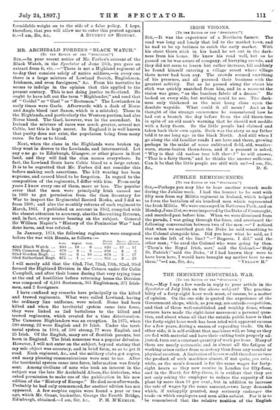MR. ARCHIBALD FORBES'S "BLACK WATCH."
[To THE EDITOR OF THE "SPECTATOR."] SIR,—In your recent notice of Mr. Forbes's account of the Black Watch, in the Spectator of June 26th, you gave an extract from it, viz. :—" There is not a Highland regiment of to-day that consists solely of native soldiers,—in every one there is a large mixture of Lowland Scotch, Englishmen, Irishmen, and even foreigners," &c. From his narrative he seems to indulge in the opinion that this applied to the present century. This is not doing justice to Scotland. He ought to have left out the term "Highlander," and used that of " Goidel" or " Gael " or "Scotsmen." The Lowlanders in early times were Gaels. Afterwards with a dash of Norse and Angle blood (not Saxon, which is a mistake). Those in the Highlands, and particularly the Western portion, had also Worse blood. The Gael, however, was in the ascendant. In Ireland the mixture of races was much greater, several not Celtic, but this is kept secret. In England it is well known that purity does not exist, the population being from many races. So far as to blood.
Next, when the clans in the Highlands were broken up, they went in droves to the Lowlands, and intermarried. Let any o ne go to Edinburgh, Glasgow, or other places in Scot land, and they will find the clan names everywhere. In fact, the Lowland Scots have Celtic blood to a large extent. It is to be regretted that Mr. Forbes did not consider this before making such assertions. The kilt wearing has been supreme, and caused blood to be forgotten. In regard to the composition of the regiments, I differ with him. From early years I knew every one of them, more or less. The popular error that the men were principally Irish caused me in 1860 to get permission from the then Secretary for War to inspect the Regimental Record Books, and I did so from 1808; and also the monthly returns of each regiment to March, 1861. I published an account in 1862, compiled with the closest attention to accuracy, also the Recruiting Returns, and, in fact, every source bearing on the subject. General Sir William Napier's "History of the Peninsular War" had done harm, and was refuted.
In January, 1854, the following regiments were composed before the war with Russia, as follows :—
Scots English. Irish. Presby. Episco. Roman tenaus. Catholics.
-42nd Black Watch ... 840 10 6 826... 19 ... 11 79th Cameron Regt.... 878 8 3 833... 3 ... 3 • 92nd Gordon Regt. ... 885 ... 5 10 878... 5 ... 17 • 93rd Sutherland Regt. 875
851... 2 ... 23 I will merely add that the 42nd, 71st, 72nd, 79th, 92nd, 93rd formed the Highland Division in the Crimea under Sir Colin Campbell, and after their losses during that very trying time at the end of hostilities before returning home the Division was composed of 6,164 Scotsmen, 361 Englishmen, 371 Irish- men, and 2 foreigners.
I have confined my remarks here principally to the kilted and trewed regiments. What were called Lowland, having the ordinary line uniforms, were mixed. Some had been kilted and when the territorial system came into force, they were linked as 2nd battalions to the kilted and trewed regiments, which created for a time deterioration. The Cameron Highlanders was an exception. In 1875, when 580 strong, 22 were English and 10 Irish. Under the terri- torial system in 1884, of 596 strong, 77 were English and 25 Irish. Of the English, many are of Scottish parents, but born in England. The Irish nonsense was a popular delusion. However, I will not enter on the subject, beyond stating that my sole object was accuracy, and in brief form, so as to get it read. Each regiment, &c., and the military clubs got copies, and many pleasing communications were sent to me. After the territorial system came into force, information was freely sent. Among civilians of note who took an interest in the subject was the late Sir Archibald Alison, the historian, who asked permission to make use of the publication in his new edition of the "History of Europe." He died soon afterwards. Probably he had only commenced, for another edition has not appeared. A few surplus copies were found a year or two ago, which Mr. Grant, bookseller, George the Fourth Bridge,
Edinburgh, obtained.—I am, Sir, &c., P. H. M'KERLIE.


































 Previous page
Previous page